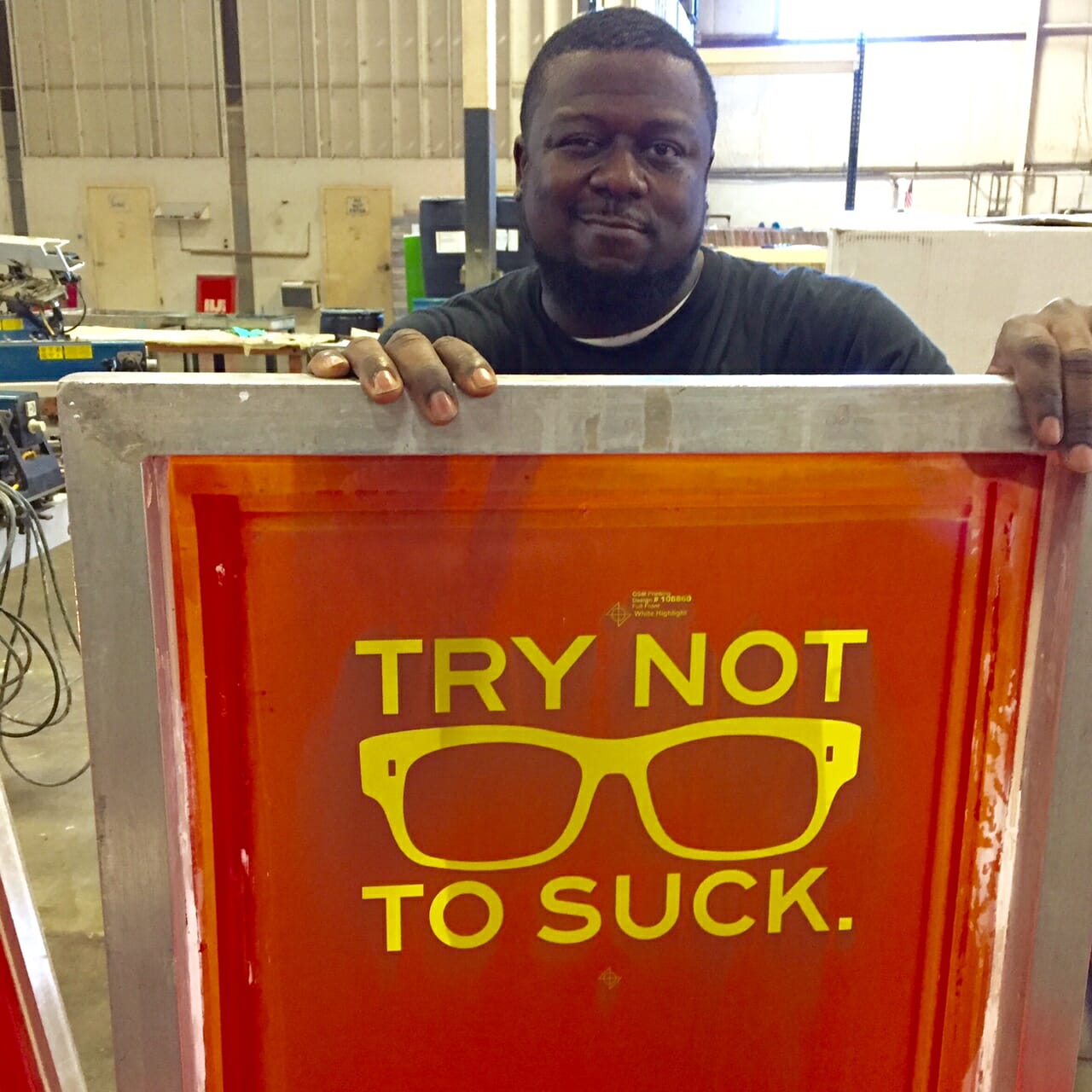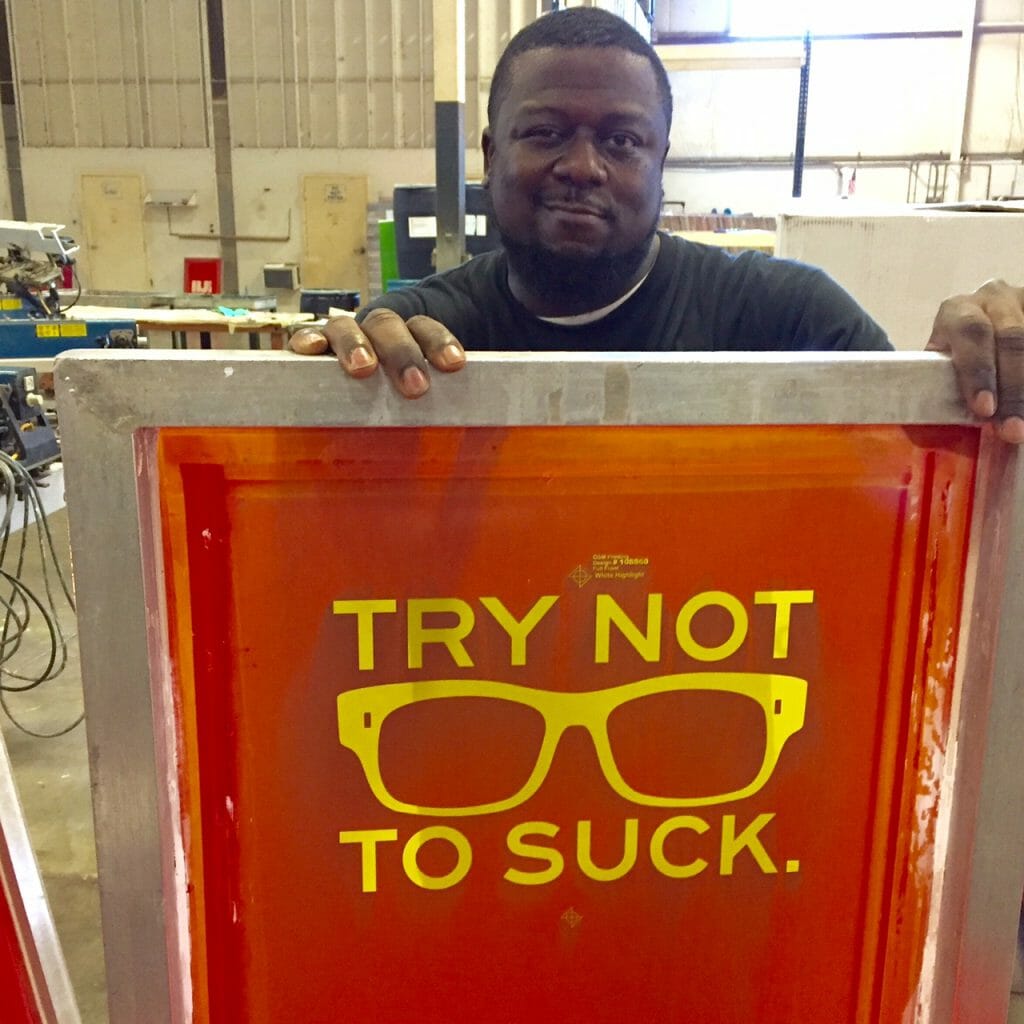
Excuses. We all make them. Your employees probably more so, but owners and managers are capable of launching them as well. I’m no saint on this either, that’s for sure.
They are as common as dirt…or maybe lint.
Here’s a list of the most repeated excuses that we hear every day, and what they really mean. Have you heard (or said) these before in your shop?
“We’ve always done it that way.”
This is the number one not-so-silent killer of shops across the land. Like heart disease. It’s the sign of someone with concrete between their ears. “We’ve always done it that way” spoken by someone in management means that they aren’t looking ahead to the future ever. They are content to just plod along until they wonder what happened. In a world where businesses must adapt or die, this spoken mantra will crumble companies from the inside out.
When there are new products or gizmos that are released into the marketplace every day, this is why your shop never moves past what they used in 1972. Does that old way still work? Sure. Is it more expensive, uses more labor, takes more time, probably unhealthy, or chock full of problems? You bet.
Yet we cling to the past methods like it’s some revered and ancient cult way of doing things.
If cutting rubylith was so great why aren’t you still doing it that way? Sure you can mix PMS colors by eye, but why would you when you can just get a scale and a mixing system and make a perfect match in a few minutes? I get it that scheduling things with a clipboard and a spreadsheet works, but maybe someone has invented some software that can make it easier.
Want to see how far you are behind? Go take a tour of some modern facilities and realize they get more accomplished in one day than you do in a month. They aren’t any better than you, they just keep up with the times. They work on getting better and eliminate excuses.
There is a reason why we don’t ride horses everywhere we go like a bunch of cowboys. Although, that might be fun.
In your shop, what can you upgrade today and make a dramatic impact to how your business will run?
“I don’t have time for that.”
This is code for either it’s “not important to me” or “I’m too lazy to understand what it means.” This phrase is generally spoken by managers or owners as a way of coping or hiding some problem they see in themselves. Sometimes it’s used when they don’t completely understand the subject matter. It’s a strawman argument. Rather than speak and voice the acknowledgement that something is amiss, or they don’t understand something, they blame it on time.
Example: Let’s start a sustainability program and learn to operate more efficiently, perform better and save money. “I don’t have time for that.”
Example: That trade show is next month. Let’s take a few people and go and check it out. We could take some classes. “I don’t have time for that.”
Example: Here’s a great article that just came out about how to improve production by changing _____________. “I don’t have time for that.”
Example: We need to build a training program to grow our own operators, so when we get busier we can add more equipment or shifts. “I don’t have time for that.”
What do you have time for instead? The status quo. Mediocrity. Higher costs. Lower skill. More overtime. Less quality. Suckiness.
“I’m too busy.”
This phrase is the inbred cousin of “I don’t have time for that.” It is standing there barefoot, wearing dirty overalls without a shirt eating fried pork rinds out of a paper bag.
If something is really important, we’ll make the time. It’s just a matter of choices. Saying “I’m too busy” just means you are choosing something else.
But here’s the thing. People have the time.
Ever notice how much faster people work when they are really busy or under the gun with a deadline? When things are a little slower, the work day magically fills up. Nobody goes home early when they run out of things to do. Could you add something important to the day if you planned for it like an order you just took from an important customer?
On a personal note, how many times a day to you check Facebook, sort through e-mail, take a smoke break, watch tv, or have some meaningless conversation with someone?
C’mon admit it. You aren’t as busy as you are pretending to be. If you eliminated the junk from your time diet, how many minutes a day would that create for you?
Another thing to throw out here is that if something needs to get handled, it doesn’t have to be you doing it. You could delegate the task to someone else in your shop, outsource it to another company to do for you or find a way to use technology to automate the function.
How can you repurpose the time you have to accomplish more? Put some effort into it.
“I haven’t got (the thing) I need.”
This excuse is a doozy. A fraud. A vicious canard.
We blame something else so we don’t have to do the work that we know we need to do. It’s a blame game. Here are the rules. First you have to make a declaratory statement about why something won’t work because you don’t have that special thing you need. Some examples:
“I can’t take big jobs because I don’t have an automatic press.”
“Our sales are down because we don’t have an outside salesperson.”
“We can’t mix Pantone colors as we don’t have a digital scale.”
“The website hasn’t been upgraded because we need a designer to do it.”
“We don’t do embroidery because we would need a digitizer.”
“We only sell local, because nobody knows who we are.”
“The only way to compete is to lower our prices.”
“We can’t print on hoodies because we don’t have a zipper platen.”
When grouped together, they all sound the same don’t they? So, for this game to work you take your excuse and just keep saying it. Sometimes once a week, sometimes more. You try to say as much as you can so you believe it. But deep down you know it’s wrong. Nobody is tallying points, but if they were you would be stuck at zero for a long time. Zero.
To quit playing the game, quit making excuses. You’ll score your first point as soon as you start working on a solution to your problem. Plenty of other people have figured it out.
“That’s not my job.”
This should be the first thing someone says on the last day of working for you.
Have you heard this from anyone at your company? This one raises the hair on the back of my neck every time.
Nothing says I’m a selfish bastard and not a good teammate than “That’s not my job”. I hate it.
Everything is your job. Either we all pitch in and make this thing work, or let’s pack it up and go home. Teamwork is the cornerstone of success. Helping out is part of that. Doing something for the person downstream from you to make their life easier is exactly what you want.
When we get behind, it’s going to take everyone pulling together to get over that mountain. This might mean the sales guy is hang-tagging his order. This might mean an artist is trimming embroidery. This might mean the owner is unloading the UPS truck. Nobody leaves until the task is complete.
If you get a paycheck, your job is to advance the company forward any way possible.
Want to know who your rockstars are in your company? When there’s a situation that calls for an all-hands-on-deck effort, they are the first ones to volunteer and will be laughing the entire time. The “that’s not my job” worker will bitch and moan and complain and fight you the whole time like a new puppy on a leash.
Always remember: Hire for attitude, train for skill. It’s the attitude part of the statement that’s crucial.
Want a better company? Get those “Not my job” people off your payroll. Yesterday.
“We don’t know anyone there.”
I’ve heard this my whole life from other people. It’s generally spoken by folks who don’t want to go to a party or event. They want that crutch of knowing that Fred or Mary will be there.
In a business setting though, it’s about trying to obtain sales from another company. “We don’t know anyone there” is the excuse that’s made when someone asks the question about why we aren’t doing business with company X.
Meeting new people is scary. We put ourselves out there and there’s that vulnerable part of rejection that stands still, waving a semaphore flag waiting for acknowledgement from another person. Will they like me? What if they don’t?
However, if you go into it with the attitude of “Hey, let’s see what happens” and possess the openness to actually stick out your hand and meet someone new…then things will work out better.
Remember, your best friend is only a handshake away.
People that are good at networking are just those that are willing to stick out their hand and meet their potential best friend or best customer. Will everyone be your best friend? No. Will everyone want to meet you? No. Will that customer want to take your call, when you interrupt their day on something they know nothing about? Probably not. I don’t like getting those calls either. Will everyone read that email blast or Twitter post? Not on your life.
However, if you do it enough you’ll meet more people, gain more customers, make more friends. You just have to be ok with the No. It doesn’t mean you are any less of a person.
So stick out your hand. Smile and introduce yourself. It will be ok.
“It’s not perfect enough.”
This one is all about waiting. Waiting until the technology is right. Waiting until the time is right. Waiting until the tea leaves read a certain way.
Guess what? It’s never perfect.
Instead adopt this mentality from General George Patton: “A good plan violently executed now is better than a perfect plan executed next week.”
What’s that mean? It means get off your butt and get going.
Is there something you’ve been thinking about doing, but have been waiting until all the planets align to get started?
Why?
Figure out how to get started and move forward. Six months from now you’ll wonder why you waited so long. It still won’t be perfect either, but you’ll be doing that new thing and making a positive difference.
Perfection is an illusion. Quit waiting for it.
“So and so tried that and it didn’t work out for them.”
This one is interesting because some people base their entire future on the questionable skill and capabilities that are anecdotally used as the primary example of why something won’t work.
Name a challenging technique or idea in the decorated apparel industry. DTG, laser-bridge embroidery, sublimation, LED exposure for emulsion, polyester or performance printing, silicone ink, web-based ordering platforms, or any other problem flavor of the month.
Let’s not forget social media too. Twitter, LinkedIn, Facebook, Instagram, Pinterest, blogs.
For every yahoo that can’t do it, there are legions of people that can. The trick is find the people that say, “So and so tried that and is kicking everyone’s butt.”
That’s the story I want to hear instead.
“We tried that once.”
This is usually code for I don’t believe in the idea or I’d rather do something else.
But are you really looking at the big picture? Will the past results predict the future performance? How hard did you try the first time? Has any of the things that made it fail the last time changed? Do the same people work for you now? Is it just you?
Where would we be if Thomas Edison stopped on his first attempt at a solid performing filament for the light bulb? Still in the dark with a candle probably.
Sometimes you have to try things repeatedly to make them work. Also, every time you do something you learn a little bit. Tweak the process and try again. Keep doing that until you figure it out. That’s how real change is made.
It might take you twenty or fifty times to do it right. Then, guess what? You are doing it right.
Those other guys? They stopped at one. Or worse, listened to the guy that said “So and so tried that and it didn’t work out for them.”
“It’s too expensive.”
Is it? Are you just looking at the price tag?
I think a lot of shop owners get hung up at the bare cost of things. Adding some equipment, a new person, some marketing, or any other idea that has a financial outlay just seems like the cash will pour out of your company like a river.
Take a look at it from another perspective. What’s the cost of not doing it? Are there any benefits that are not obvious at first blush when looking at something?
For example, the most common subject in any forum is knowing when to go from a manual print station to an automatic machine. The financial decision is more than just for the equipment, as this may mean adding the electrical infrastructure, more people, a new dryer, more consumables to support the press, and other considerations. It can be a lot of money.
On the plus side, that 1000 piece job that you outsourced (or worse, turned down), or took a few days to print will be knocked out a few hours. Done. Next up. Go.
Successful shops that have added equipment to the mix start getting to the next level in sales sooner, as they are forced to keep feeding the bear. The growth spurs on more growth.
When we say, “That’s too expensive”, we are talking about the present state. What about the future state?
Can you afford to not get to that next level?
How could your shop be impacted by adding a manager with years of knowledge to your small payroll? Where will your sales total be next year if you add to your marketing budget to recruit new customers? Could your company be more organized by going with that shop operating system that’s custom tailored to this industry? Will your prints look better if you switch to a better quality ink? Will you have less thread breaks and longer runs if you quit using that cheap thread? How good would you be if you took that class?
Sometimes you do get what you pay for.
“Nobody cares about that.”
I do. Your customers do. Your employees do. Usually the person that says that is speaking from a bullying perspective. Empathy level is pegged at zero.
People do care. Do they voice that opinion? Most often not. But that doesn’t mean they don’t have a viewpoint.
Are you asking if they care? What happens if you shift your initial judgement on the point from “Nobody cares about that” to “Well, what do you think?”
Can you be inclusive? Can you invite more people to the conversation? What do you think will happen if you start a dialog about a topic?
Are you scared to do so because of the subject matter? What if everyone disagrees with you?
What if (horror) you are wrong?
Maybe that’s why those four words are being spoken. “Nobody cares about that.” It takes on an entirely new meaning if you think about why someone says it.
Here’s the thing…people care. The real question is, does it matter to you that they do?
Quit Making Excuses
I’m sure there are plenty of other common excuses muttered in our shops all day that I didn’t include here. If you listen out for excuses when something doesn’t go as planned, that can give you a clue as to what you need to change. Then the hard part comes. Making the change.
If you are ready to quit making excuses, then you are ready to build your culture of performance that is going to catapult you to the next level.
Just try to say it a different way. Maybe ask more questions.
“It is wise to direct your anger towards problems, not people; to focus your energies on answers, not excuses.” – William Arthur Ward
“99% of failures come from people who have a habit of making excuses.” – George Washington Carver
“He that is good at making excuses is seldom good for anything else.” – Benjamin Franklin
“Leadership is about taking responsibility, not making excuses.” – Mitt Romney






20 comments